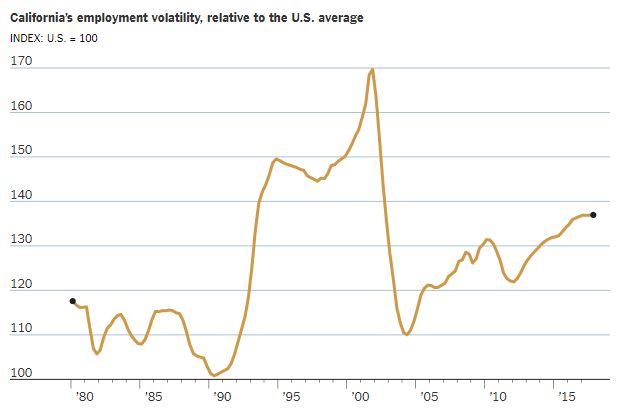"Still, economists generally agree that the stateâs long-term prospects are bright."
I think it will be interesting looking back on this NY Times statement in a couple of years.
February 13, 2018
Boom and Gloom: An Economic Warning for California
By CONOR DOUGHERTY
NYTimes.com

Whether in recessions or booms, Californiaâs economic cycles tend to be more volatile than overall national trends.
SAN FRANCISCO â The United States is on track to achieve the second-longest economic expansion in its history. Unemployment is at a 17-year low. And Californiaâs state budget has a multibillion-dollar surplus.
So why is its longtime governor, Jerry Brown, issuing prophecies of doom?
âWhatâs out there is darkness, uncertainty, decline and recession,â Mr. Brown said recently after presenting his final budget to legislators.
California has accounted for about 20 percent of the nationâs economic growth since 2010, significantly more than its share of the population or overall output. But Mr. Brown, in his final year in office, has raised the question on the minds of those paid to think about the economy: How long can this last?

Gov. Jerry Brown before his final State of the State address last month. Even as he has cautioned about fiscal indiscipline,
he has advocated big infrastructure projects.
For California and the nation, there is a long list of things that could go wrong. A surging budget deficit could stoke higher interest rates. And if the recent upheaval in stocks signals a longer-term decline, it would hurt California in particular because its budget relies heavily on high earners whose incomes rise and fall with the market. President Trumpâs moves to upend longstanding trade arrangements could be a setback for the state, home of the countryâs biggest port complex. And because the growth of the technology industry has played a huge role in Californiaâs recent boom, a drop in company valuations or in venture capital investments would reverberate swiftly through the stateâs economy and tax receipts.
âI donât think thereâs any reason to believe we are going to have a recession this year or the next year,â said Christopher Thornberg, founding partner of Beacon Economics, a consulting firm in Los Angeles, referring to Mr. Brownâs grim forecast. âHeâs just pointing out the obvious, which is that things feel good now but there is going to come a time when all hell is going to break loose â and we better be ready for it.â
Mr. Brownâs statements highlight Californiaâs distinction as a state of high highs and low lows. From the recession of the early 1990s to the 2001 dot-com crash to the housing collapse of a decade ago, downturns often end up being more pronounced in the state than elsewhere. The next recession, whenever it comes, will almost certainly land harder here than it does in the rest of the country. And that boom-bust pattern is especially tough on Californiaâs budget â something that Mr. Brown, who was first elected governor more than four decades ago, knows well.

California has accounted for about 20 percent of the nationâs economic growth since 2010, far more than its share
of the population or overall output.
In 2009, as the last recession took hold, California state revenue fell 19 percent, versus 8 percent for state revenues nationwide, according to Moodyâs Analytics. There has been a strong rebound since then, but the gains are unlikely to last. That is because Californiaâs government relies on a heavily progressive income tax that generates most of its revenue from a relatively small number of wealthy taxpayers whose incomes are erratic.
Even a blip in the stock market can punch holes in the stateâs budget. And because stock prices have more than doubled during Mr. Brownâs term, it seems like a good bet that whoever succeeds him will face challenges. If and when that day comes, any proposal to increase taxes will probably be unpopular. Mr. Brown already raised income taxes to address the stateâs last budget mess, and California taxpayers took a further hit as a result of the new tax bill, which curbed the deductibility of state and local taxes on federal returns.
âHis successor gets a world in which revenues are more volatile,â without the option of raising taxes, said David Crane, a lecturer in public policy at Stanford University and a former adviser to Mr. Brownâs predecessor, Gov. Arnold Schwarzenegger. âThatâs a really tough world to operate in.â

Big Swings
The economy and job market are more volatile in California than in the nation as a whole. The stateâs job losses are more
severe in bad times, and the gains are more pronounced in good times.
A recession would also further expose problems that have festered for decades. Across California, cities and school districts are having trouble keeping up with ballooning pension obligations, squeezing teacher salaries and state services. In warning about budget troubles to come, Mr. Brown was making a case for adding more of todayâs surplus to the stateâs rainy day fund to cushion the blow of the next downturn.
Mr. Brownâs final State of the State speech also included plenty of optimistic notes and pushes for big spending in the future on items mostly outside the stateâs general fund. He talked about âsetting the pace for the entire nationâ and embracing big infrastructure projects like a high-speed rail line despite doubts about its viability as costs mount.
âYou have all of these projects that he wants to do,â said Stephen Levy, the director of the Center for Continuing Study of the California Economy, an independent research organization. âHeâs saying, this year may be rosy, but watch out, it ainât going to continue. And I agree.â

Construction crews in Los Angeles reflect a boom in building hotels, shopping centers and high-rise condominiums. The
question is how long it can last.
Even in prosperity, California has plenty of problems. The bulk of its recent gains have flowed to wealthier coastal cities, leaving inland areas behind, and a severe housing shortage has led to punishing rent increases and rising homelessness.
Still, economists generally agree that the stateâs long-term prospects are bright. It is home to many of the worldâs most valuable and innovative companies, and it attracts an outsize portion of the skilled work force and venture capital financing, helping it create new industries as old ones slow down or fade away.
And recession forecasting is a tough business even for those whose livelihoods depend on it, like Ed Del Beccaro, a senior managing director in the Walnut Creek office of Transwestern, a commercial real estate brokerage. He manages a team of brokers and travels around the Bay Area giving speeches and forecasts to chambers of commerce and other business groups.
âTwo years ago I was predicting a recession in September of 2017, and in October I said we were going to have a recession at the end of 2018,â he said. âToday I think that unless we get bombed by North Korea, we will have a pretty amazing two years of growth.â
With a sudden spurt in demand for office space, Mr. Del Beccaro said, he is hiring new workers and spending more on marketing to prospective clients. âI was just authorized to go out and get more brokers and offer them incentives to hopefully get them to switch over from other companies,â he said.
But winter will come eventually, and when it does, Mr. Brownâs counsel about planning ahead may help shape how California weathers it.
http://www.nytimes.com/2018/02/13/business/economy/california-recession.html
